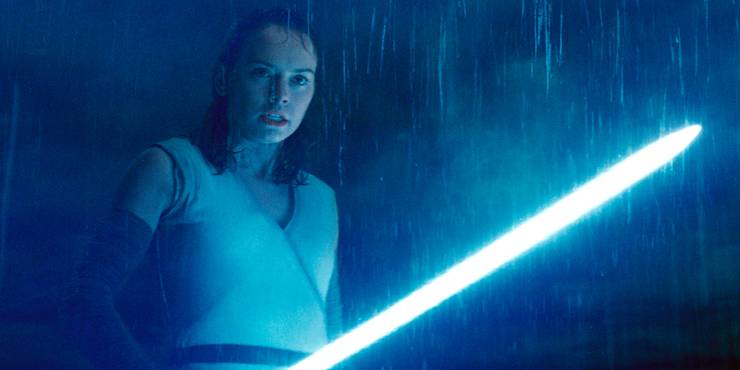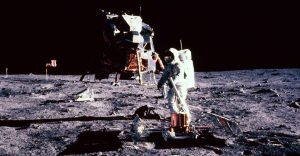Why Rey Skywalker Was The Only Way Star Wars Could Have Ended

Star Wars: The Rise of Skywalker‘s “Rey Skywalker” twist was the only way the Star Wars saga could have ended. When Disney acquired Lucasfilm, the studio had high hopes for the sequel trilogy. Unfortunately, Star Wars: The Last Jedi divided the fanbase, and Star Wars: The Rise of Skywalker has proved controversial as well.
Critics have focused particularly on the closing scene, in which Rey visits the desert world of Tatooine and claims the “Skywalker” surname. No doubt Lucasfilm hoped this would be a powerful end to the Star Wars saga, but sadly the execution doesn’t quite work. It feels like fan-service, another desperate attempt to appeal to nostalgia in a film that was overly reliant on that approach.
Oddly enough, though, these criticisms really aren’t fair. The “Rey Skywalker” scene is an effective cap to the entire story, and it fulfills a lot of the franchise’s most important themes. It’s true that, in execution, it could have been done a lot better; but the concept was sound, and there was probably no better way to end Rey’s story.
How The Force Awakens Set Up Star Wars’ Rey Skywalker Ending

Lucasfilm recently published The Art of Star Wars: The Rise of Skywalker, and it includes a transcript from a meeting of the Lucasfilm Story Group back in 2014. In it, they openly discuss the end of Rey’s story, and already they’re considering having her claim the Skywalker surname. “I like the idea that she’s going to be our Skywalker, but she’s not a Skywalker,” Pablo Hidalgo notes. “Then, for our purposes, ‘the Skywalker’ is really a metaphor. It doesn’t have to be something that’s directly connected to blood.” While it’s true Lucasfilm has often claimed to have things planned in advance when they were making it up as they go – a habit they picked up from George Lucas himself – there’s no reason to disbelieve this claim. The idea is actually clearly foreshadowed in Star Wars: The Force Awakens.
One of the core themes in Star Wars: The Force Awakens is Rey’s quest for self-identity. This is why Rey doesn’t have a surname; it is a symbol of her lack of identity, indicating her desperate need to belong. She first begins to find her place in the galaxy when she ‘hears’ the lightsaber’s call, and reaches out to touch it. But this isn’t just any lightsaber; it is the Skywalker blade, passed down from one generation of Skywalker to the next. It was used by Anakin Skywalker until he fell to the dark side and became Darth Vader; it was claimed by Luke Skywalker when he decided to follow in his father’s footsteps and become a Jedi Knight; and now it has found its way to Rey. “The belonging you seek is not behind you,” Maz tells her. “It is ahead.” It will be found in embracing her role as the Skywalker.
Rey Skywalker’s Ending Works No Matter Where She Comes From

Maz Kanata may have encouraged Rey to focus on her future rather than her past, but audiences were just as interested in the question of where the Jakku scavenger had come from. It fell to Rian Johnson to answer those questions in Star Wars: The Last Jedi, and he chose to reveal Rey was simply a nobody. “[Your parents] were filthy junk traders,” Kylo Ren told her, “who sold you off for drinking money. They’re dead in a paupers’ grave in the Jakku desert.” Essentially, Kylo Ren served the same purpose as Maz Kanata in Star Wars: The Force Awakens, albeit more forcefully and with a very different agenda. He told Rey she could not be defined by her past – indeed, she had no past to be defined by – and instead must choose her destiny. This perfectly sets up the idea of Rey becoming a Skywalker by choice, the one who brings balance to the Force.
Kylo Ren’s revelation shocked the Star Wars fanbase almost as much as it did Rey herself. The resulting controversy led Lucasfilm to perform a sharp pivot, and in Star Wars: The Rise of Skywalker they revealed Rey is the granddaughter of Palpatine. Kylo Ren was right when he said Rey’s parents were nobodies, but only from a certain point of view, just as Obi-Wan Kenobi wasn’t being entirely truthful when he told Luke his father had been killed by Darth Vader. It’s an awkward retcon, and yet returning director J.J. Abrams felt it added new depth to Rey’s choice to become a Skywalker. Would Rey allow her past to define her, and succumb to the seduction of the dark side, or would she embrace the destiny of the Skywalkers and defeat the Emperor once and for all? Abrams’ retcon may have changed the journey, but Rey’s destination is the same; the moment she calls herself a Skywalker.
Why Rey Skywalker Was The Right Ending For Star Wars

It’s frankly a shame the “Rey Skywalker” scene has become so controversial, because in truth it taps into some of the most important ideas in Star Wars. To be a Skywalker is to choose to live a life of balance, and to bring balance to the Force itself. Balance is a fleeting thing; in Greg Rucka’s novel Guardian of the Whills it is said to be as ephemeral as “the moment between breaths.” It can only ever be a temporary state of affairs, and thus Anakin and Luke brought balance when they defeated Palpatine on the Second Death Star, but it did not last because the Sith fought against the balance of the Force and resisted death itself. Rey, therefore, unwittingly chooses to incorporate herself into the prophecy of the Chosen One. As production designer Rick Carter observes in The Art of Star Wars: The Rise of Skywalker, “The Episode I prophecy was that a Skywalker was somehow going to help balance the Force. Rian Johnson opened Star Wars up to the possibility that, if Rey is not a Skywalker by blood, then being the mythological Skywalker is something you can aspire to and achieve in your life.“
George Lucas famously said Star Wars should be like poetry, and indeed there is something so very poetic to the idea of Rey becoming the Skywalker. It fits perfectly with the longstanding Star Wars theme of family, it mirrors Luke’s journey to become a Jedi Knight, and it corresponds with the Hero’s Journey trope that has so profoundly influenced the franchise. Novelist Rae Carson, who penned the novelization of Star Wars: The Rise of Skywalker, pointed to another layer opened up by the idea of a Palpatine becoming a Skywalker.
“My current take is this: The entire Skywalker saga is about Palpatine turning or trying to turn Skywalkers to the dark side. He especially hopes that Rey will prove a worthy vessel for his own power and ambition and become the Skywalkers’ final downfall. But in spite of all his efforts over the course of three generations, he fails. Rey rejects everything about him and takes on the Skywalker mantle and legacy. In the end, it’s a Palpatine who turns to the light, thus handing the Skywalkers their ultimate victory.”
In truth, whatever twists and turns the sequel trilogy took, Rey Skywalker was always the logical conclusion. It’s true the execution was poor, thus inviting criticism; but the concept is profound and powerful, for all it has been handled badly. There was no better way for the Star Wars saga to end.
About The Author


















